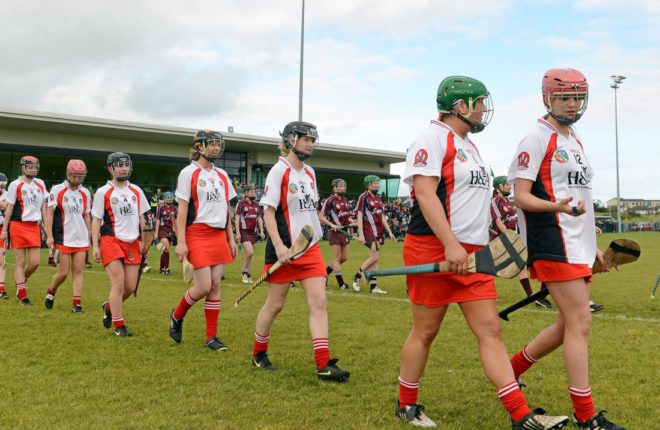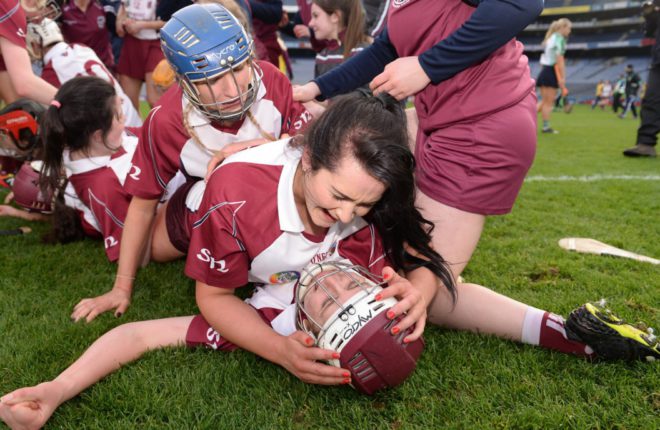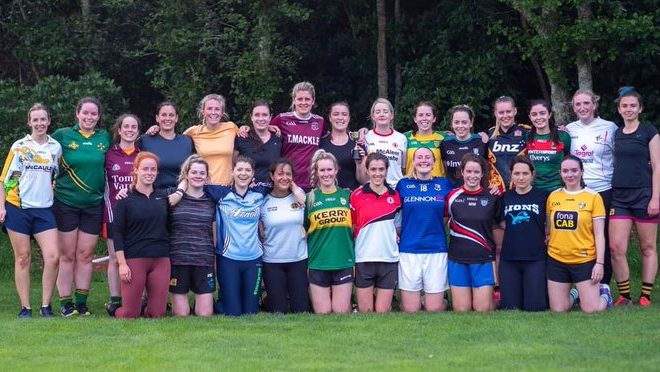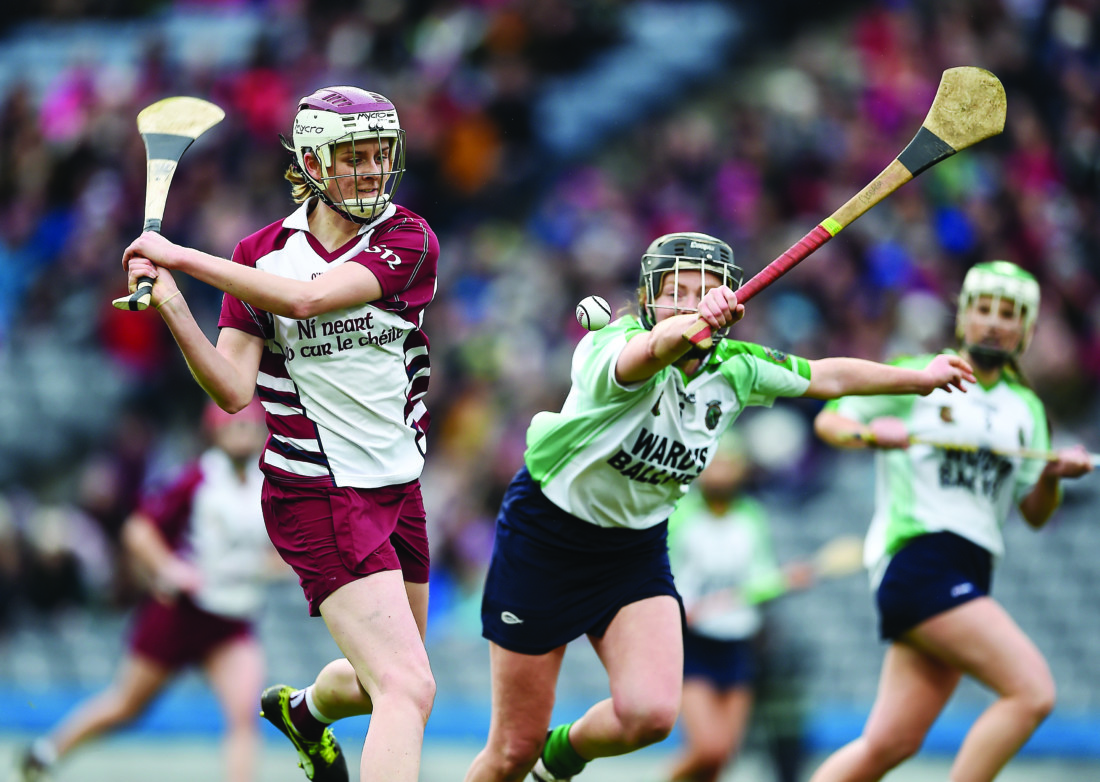After winning three All-Ireland titles with her native Sleacht Néill, Eilís Ní Chaiside is mixing camogie, football and travels on the other side of the world.
By Michael McMullan
THREE years after arriving in New Zealand, Sleacht Néill and Derry All-Ireland winner Eilís Ní Chaiside has settled well into life at the other side of the world.
She has swapped the fast lane of challenging for the biggest honours camogie has to offer with a more relaxed and varied outlook to sport – mixing the wee ball and a new-found footballing career on the other side of the world.
It’s just before seven o’clock on Monday morning at her home just outside Wellington, and the video link is as clear as her love for her new home from home.
The great outdoors and culture still pull at her heartstrings.
It takes a very careful listen to find the faintest Southern Hemisphere twang hugging the end of a sentence.
When not teaching, she takes every opportunity to travel the country’s northern and southern islands.
Walking, trekking and mountain biking feature in a lifestyle that remains just as active as it was under the slopes of Sleacht Néill’s Carntogher mountain. It’s just a different kind of active.
Her late father Thomas was at the forefront of language, culture, camogie and hurling.
Her mother Anne Marie dreamt of having her three daughters – Eilís, Aoife and Bróna – lining out and winning championship honours together.
A Derry Championship would’ve been special, but to have glory in Croke Park was unthinkable.
Away from Emmet Park, their home was a hotbed of activity.
“Mammy was a bit of a naturist, she is into the birds, the native bushes and the berries,” said Eilís, who fondly recalls checking out the countryside after school.”
It was the playground away from sport.
“Uncle William James (O’Kane), who was part of the Sperrin Walking Group, he would’ve brought us away for a day to the Glens of Antrim, or Donegal and all around Ulster with him enjoying trips out,” she adde
“The older we got, the more accomplished we were according to distances and elevations.”
Invariably the GAA would shape their lives.
“My first memories are at home out on the front pitch,” said Eilís, the second of seven siblings – three girls and four boys – Cathaoir, Éanna, Seán and Fearghal.
Formal coaching would come along with school and the younger age groups in Sleacht Néill. Eilís doubled up her camogie with a place on the hurling team up to the u-14 cut-off point in 2005, lining up alongside football sharpshooter Christopher ‘Sammy’ Bradley.
She was overage 12 months later when the club ended an 11-year wait for a second Féile hurling title, with younger brother Éanna still on the team alongside Karl McKaigue, Sé McGuigan, and Oisin O’Doherty from the previous year.
At home, two sets of goals converted their spacious front garden into a hotbed of activity, meeting somewhere between laughter and the raw desire to win.
Neighbours, cousins and school friends would rock up and the games began.
“There could’ve been anybody and everybody really,” said Eilís of the perfect grounding for a sporting career.
“You were definitely getting an indirect line to toughness and what it was to be competitive at that stage.
“You had to take it on the chin, you had to get up and get on with it. There was no referee ever, or no Mammy out checking if we were playing within the rules.”
The rough and ready approach helped instil a competitive edge for the bigger stages with major titles in the line.
There was plenty of fun mixed in and a stray ‘whack’ here or there, but nothing ever festered into any grudges. It was par for the course.
As the years passed, Sleacht Néíll underage teams came calling.
If it wasn’t her own training, or being ferried to coaching sessions her father was taking, Eilís recalls the crew being loaded up and taken down to the pitch with anything from hurls to roller stakes or bikes for company.
“It was all pretty busy, not always directed at the GAA. We were always busy walking, running or doing whatever there was at the time,” she said.
Looking back, there is a deep appreciation for the love and dedication of their parents.
“We were very fortunate that Mammy was a housewife and grateful she was in that position and she cared as much as she did,” Eilís said.
There was always a lift somewhere, a hot meal on the table and that caring arm that knew no bounds.
“Not all children grow up with that, feeling the generosity of having a parent at home all the time.
“When we were younger, we didn’t realise it, but now we are working and see how busy lives can get and see the money it takes to rear children, not to mention a whole big squad of us,” she said of their parents’ seismic input.
“Intrinsically, Daddy was very motivated and had ideas of his own that he would be carrying out, not wanting thanks for or recognition for.”
The start of the Sleacht Néill success story began with the arrival of a glut u-14 Féile hurling titles, but it was u-16 and u-18 level before the camogie silverware began to arrive.
“I was definitely jealous of Éanna and Sé McGuigan and their team. They always seemed to be winning back-to-back (titles) the whole time and Daddy would’ve been involved there too with the management,” Eilís admits.
“Teams were heading off and getting to stay in host houses around the country. They were going to Laois one year and away Wexford the next year.”
She remembers playing an u-14 final against a Ballinascreen hurling team and a bit of “argy bargy” between Éanna and one of the two girls on their team.
“It was more that she was pushing for the fight,” Eilís jokes. “You’d be marking the girls, but sometimes you’d be marking the boys and you had to get on with it.
“It was more embarrassment on their behalf than mine I would say, especially at that age.”
When Sleacht Néill began to taste their underage camogie success, they were punching above their weight.
“Ballinascreen were the dominant team at that time,” Eilís points out, referring to their superior numbers and “three or four” primary schools.
“I remember turning up to play ‘Screen and there would’ve been a different person or a different name,” Eilís said.
“Whereas with Sleacht Néill, you had the same 10 or 12 players there day in, day out. You really had to rely on those players to come together and form a team.
“We began to have a bit of camogie success ourselves at u-16 and u-18, so it was a reminder that all this hard work at underage doesn’t go unnoticed and it pays off down the line.”
Younger sister Aoife, goalkeeper Jolene Bradley and cousin Gráinne Ní Chatháin moved up from underage with Eilís, who broke into the senior ranks at the age of 15.
Lavey were top of the tree and she remembers coming into a senior team that contained Claire Doherty and Helena Kelly, players who she had watched playing in Croke Park with Derry.
“Susie Kelly and Shauna McGuigan were some of the others there…I was thinking ‘I’m only a wean’ as I felt that young,” Eilís said.
Shortly after, the ruling came in to fobrbid u-16s from senior teams, but Eilís had already embarked on her learning curve.
The reading of the game needed to improve. Playing at the top level required an improved decision-making process of when to give and when to keep possession, where to shot from and how to create space. Every game as a school day, a means to an end.
“The more often you play and gain maturity in your own game, you come to realise more things and become more vocal,” Eilís added.
There was also a need to help steer newcomers into the scene and once players cross the white line, it’s up to them to steer the ship.
No matter how hard they tried, Sleacht Néill’s story was a continuing tale of woe.
She recalls the day after a gut-wrenching one-point extra-time defeat at the hands of Lavey.
“My Granda (Jim O’Kane) was my only grandparent I ever knew. He wasn’t a GAA man but a great man for the community,” Eilís said, recalling a time he was saying with them.
“He thought we were wasting our time chasing a white ball around a pitch and that we could’ve got injured.”
With every second word bringing thoughts of that extra-time defeat to Lavey, Eilís’ emotions grew even more raw.
“I remember Granda asking us why we kept on playing if it was so hurtful,” she said.
There was logic in his thoughts, but, to Eilís, the disappointing days only made success all the sweeter. Her talents caught the eye of neighbour and joint Derry senior manager Gerard McErlane (with John A Mullan), who called her on board to anchor their defence.
Things began to turn in 2012 with an All-Ireland Intermediate title after Derry’s replay win over Galway, the county’s last success.
Eilís landed a goal from centre back to put the Oakleafers seven points up in the drawn game, but when Galway stormed back it took a late goal from Karen Kielt to earn a second bit at the cherry, which Derry gladly took.

FULL FOCUS…Eilís (6) in the parade before Derry’s 2012 All-Ireland Intermediate final replay win over Galway, her sister Aoife (3) was always part of the winning team
Later in the summer, silverware continued to flow as Sleacht Néill won their maiden Derry Senior title, but after losing to Coleraine in the next two seasons there was a concern it was going to be a flash in the pan for the Emmet’s.
“After 2012, we were thinking is this the be all and end all…wondering is this as far as we are going to go,” Eilís said, thinking of neighbours Swatragh’s illustrious history of winning 19 successive titles.
Manager PJ O’Mullan missed the 2013 decider with his commitments to Loughgiel hurlers, but Eilís felt her preparations were hampered after returning from a six-month study exchange trip in Belgium.
“I was only back and hadn’t the same fitness level or had been exposed to the same amount of training,” she said, also confessing to “crying myself sore” after losing to Coleraine in the decider 12 months later.
Sleacht Néill did what they do best and kept knocking at the door, getting their revenge in 2015 by blitzing Coleraine on the way to a final win over Swatragh
It has been an unprecedented spell which brought seven successive Derry titles, six at Ulster level and three All-Ireland titles, something Eilís feels came from a combination of factors.
A tightly knit community had a massive influence, with little other than camogie and the GAA club on offer.
She admits to feeling that shared responsibility of growing up and playing the club.
“We hadn’t got the pick of the crop of 200 players,” she said. “I was thinking I am going to commit to this and I am going to become good at it. When you enjoy it, stick and it and like it, it becomes all compassing and you rally behind it.
“It is the same for other players at the same time, they wanted to better themselves and there to represent the club.”
Years of commitment and near misses in crunch games proved they were not too far away.
The age profile helped and everyone threw their weight behind the cause.
“It was a stroke of luck having so many great players all there at the same time,” she said.
After losing to Loughgiel in 2015, they were back 12 months later, but were dealt a shattering blow.
“Losing Daddy was definitely a big thing,” Eilís admits. “We really rallied together and the support at that time was massive.
“You were brought on in a gust of wind. You didn’t really know what you should’ve or shouldn’t have been doing, but you were just leaning on other people.”
The support helped steer Eilís, her sisters and the group from session to session and game to game.
Going into the finals, there was the sense of the unknown, from their opponents and vice versa, before success catapulted Sleacht Néill onto the map.
“The gym sessions, the running sessions, the meet ups, it was big ask,” Eilís said. “But, because you were enjoying it at the time, for me, it was a bit of therapy and you came to nearly rely on it and wanted to be there every single time.”
Locked in the team’s bubble, the collective drove the standards through the roof.
“With the management, Dominic (McKinley) was fantastic,” Eilís stated. “He expected an awful lot of us and we gave it back every single time, rising to the occasion. He definitely developed us as a collective to no end.”
It was enough to take them back from the jaws of defeat in a drawn Ulster final against Loughgiel before Mary Kelly’s dramatic goal helped steer them to a first Ulster title when the replay lay in the fire.
Therese Mellon’s goal spearheaded an All-Ireland semi-final win and it was on to Croke Park for the biggest game in club camogie.
Kelly again found the net in the final, but the Emmet’s needed a late wonder score from Eilís to ensure the All-Ireland title was heading north.
It was Kelly’s kick pass that crept into Ní Chaiside’s path on her less-preferred left side, with a testing angle and with her side holding a slender one-point lead.

WE DID IT…Eilís (on the ground) and Mary Kelly celebrate Sleacht Néill’s first All-Ireland camogie title in 2017
“The game was going to the wire and bodies were dropping with cramp…there is no hiding place,” she said.
“I remember hitting that ball and swaying my body, urging it to come in and it couldn’t have come at a better time.”
“I remember asking myself how much longer was left. Sarsfields would’ve been on the back foot and then down that pitch. The McGrath girls are flying fit good players, so my heart was in my mouth.”
While taking an All-Ireland title back Sleacht Néill was the Everest in terms of the achievement, the drama and emotion of their two-game Ulster final will never be forgotten.
“We buried Daddy on the Friday and that (drawn) match was the Sunday,” an emotional Eilís recalls.
Amidst the “unbelievable” support and noise in the Athletic Grounds, deep down, she was questioning playing in the game.
“What I even am doing here,” Eilís remembers asking herself. “Coming away from that match, I was so relieved to get another shot at it. I was thinking there is no way I can be this tired, exhausted or this far gone again.”
With the interest in the sport in Ulster growing, playing the replay in Glen added to the occasion in front of a bumper crowd.
“Mary Kelly is an absolute hero and always will be”, Eilís beamed. “I will never forget Jerome Quinn’s footage and the stand in Glen when she scored that goal…with everyone jumping like mad.”
After the game, the pitch was packed with family and fans, with players from all over Ulster offering messages of congratulations.
“To be able to share the victory with everybody was so special and you don’t get that in Croke Park,” Eilís compares.
“It is more reflective of what you do on a week to week basis, because it is local area and the pitch. It was extra special and that match, I will never ever forget it.”
Another back to back trio of Derry, Ulster and All-Ireland medals followed, but Eilís had itchy feet and wanted to see what the rest of the world had to offer, just like her parents did when they spent 18 months living in Australia during their youth.
It was always a plan to jet off on graduation from university, but after sticking around to earn a few bob to help her on her way, she was embroiled in a camogie whirlwind of game after game.
“It was hard to walk about from it and when Daddy got sick, I just didn’t want to be away from home,” Eilís admitted.
The euphoria of a third All-Ireland subsided before she booked her ticket.
“I thought if I don’t go and travel before I turn 30, then I am not going afterwards,” she said, with her mind now leaning towards New Zealand.
“I said that’s it…I’m retired. I walked the Camino de Santiago, did a bit more travelling and then packed my bags.
“There are fewer creatures that want to bite you or sting you,” she laughed or decision of going to New Zealand. “The lifestyle lends itself to the outdoors and country living…and the Department of Conservation do a fantastic job.
“Everything is well set up, there are huts here and hikes where you can go for days on end into the wild. There is no (phone) reception, but you are guaranteed a shelter at least.”
All those years exploring around the slopes of Carntogher planted a love of nature.
After leaving on a holiday visa and working initially in the hospital, she decided to plant her roots and apply for a teaching job.
With Covid arriving, she counts herself fortunate at securing a permanent job. Without guaranteed employment, she would’ve been forced back to Ireland.
“During that time I got to see more and fall in love with New Zealand,” she said. “I made my first trip home this summer and there is nothing that beats the Irish people, like the craic and all the chat among the neighbours.
“You can’t beat that wherever you go in the world, but I am happy here (In Wellington) for now. It is very laid back. There is no hype about how you dress or what brand you wear.
“It’s not about money, people here are very open and welcoming here. There are a lot of migrants here so it is very fluid.
“It is very young in its general history…New Zealand has agreed with me a whole lot.”

REMEMBER YOUR ROOTS…Eilis, wearing a Sleacht Néill jersey, sponsored by her late father Thomas’ business T Mackle, after success with her football team in New Zealand
One of the first things on arrival was to touch base with the local GAA club in search of a camogie team before discovering Wellington/Hutt Valley GAA club also offered football.
“I didn’t have any plans to play football,” she admits. “They have a social league and play on Wednesday nights so I said I’d play.
“I was a reluctant Gaelic footballer, I never wanted to commit to it. Camogie has always been my first love, but after the first year they asked me to play in the (football) league.”
A bad concussion injury during one of the Social League finals’ game kept her out of action, but the growing sporting repertoire always gave her another option.
“Outside of the club, I do some mountain biking and gym work, so there is never any week that goes by that I am not doing something that is different from the GAA,” she said.
Now, GAA is all about enjoyment without the high level championship scene of back home.
There is room to switch off without seasons merging into each other.
“It was wearing me down come the end,” she said of the camogie scene back home. “I was thinking I just need to get away from this, especially to grieve and to accept the fact that Daddy had passed away.
“In that whole time (back in Ireland) through the winter, it was a blessing because you were kept busy and weren’t thinking about it. But then you needed that space of mind and body to accept what had really happened…to grieve,” Eilís continued.
“My memories of Daddy are intertwined in the camogie and hurling and the club. There was one big triangle, there was camogie, there was Daddy and there was me.
“It was a constant rotation, so you needed to step out of that environment to really recover and grieve.”
After a three-year hiatus due to Covid, Eilís and her club are heading to Melbourne for the Australasian State Games at the end of September.
“I have a new circle of friends and through the club it is a great way of meeting other Irish people,” she said.
“There is the Irish language community, the Irish society and a number of different circles…but, playing sport, as an adult, it is one of the fastest ways of meeting people.”
There is a sprinkling of players from Ulster – mainly Antrim – in the club. Steelstown’s Tony Ling was the only other Derry voice before he returned home.
“The people here couldn’t believe we were from the same county, with his city accent and mine from south Derry…we were flying the flag for Derry,” Eilís joked.
The club has “a good mix” of New Zealanders, Aussies and exiles from around the world.
Those living abroad with Irish friends are keen to get involved and give it a go.
“They think we are bonkers,” she said, explaining how they see Gaelic football as an extension of the AFL and hurling and camogie being a cross between the sports of hockey and lacrosse.
With the club entering an intermediate team at the games this year, it tells how much GAA is continuing to grow away from Irish shores.
“We are training away at the minute, two days a week indoors,” Eilís said of their preparations.
“In September we will be outdoors on the 4G pitches, rugby pitches or wherever we get. We have no grounds of our own, so we have to take what comes to us. The committee do an amazing job of coordinating all that and the payment of it all.
“At home you have a support network of parents and retired players in the clubs,” she explains.
“Here is it the players who are on the committee and do the organising, so it is good to have as many people as possible, especially coming up to the tournaments.
“There are presentations and fundraisers, so it is a close-knit community like home.”
But the club never stays the same. With the nature of exiles on the move, some stay for a year and move one, while other stay and become woven in the fabric of Wellington’s Irish scene.
A glance at the club’s website and you see Eilís listed the camogie coach, complete with pen pic photo.
It’s hardly a surprise. Thomas’ baton of giving something back has been passed on.
After returning from a summer in Sleacht Néill, she is content back in New Zealand. Eanna’s visit from Australia was a welcome familiar face.
“I have applied for my residency at the minute and I am happy here for now,” she admits.
“Culturally, I am very Irish on the inside with the language and the sport.
“The lifestyle is suiting me here at the minute and I will probably stay here to get as much out of it as I can.
“I will be able to travel to the likes of Fiji and Samoa and islands that are less recognised, to get as much out of that before I head over the Northern Hemisphere.”
From one picturesque landscape to another, Eilís Ní Chaiside is far from the slopes of the Carn. The sports may vary, but she’s never lost her love of being active and great outdoors.
She has struck a new balance.
Receive quality journalism wherever you are, on any device. Keep up to date from the comfort of your own home with a digital subscription.
Any time | Any place | Anywhere












